- Home
- P. D. James
The Part-Time Job
The Part-Time Job Read online
Praise for P. D. James
“[The mystery] genre’s most talented practitioner ever.”
—The New York Times
“I have often thought of mysteries as the sorbets of literature, something light and tangy to clear the palate between more serious courses. The books of P. D. James, however, are more substantial fare, fulfilling as well as delicious.”
—Linda Pastan, The Washington Post
“A craftsman with a poet’s vision, [James] not only detects evil but attempts to uncover the more elusive—and enduring—enigmas of the human psyche that lead to it.”
—Time
“James explores the lowest of depravity…with the most elegant prose.”
—USA Today
P. D. James
The Part-Time Job
P. D. James was the author of twenty-one books, many of which feature her detective hero, Adam Dalgliesh, and have been televised or filmed. She was the recipient of many honors, including the Mystery Writers of America Grand Master Award and the National Arts Club Medal of Honor for Literature. In 1991, she was created Baroness James of Holland Park. She died in 2014 at the age of ninety-four.
ALSO BY P. D. JAMES
Fiction
Sleep No More
The Mistletoe Murder and Other Stories
Death Comes to Pemberley
The Private Patient
The Lighthouse
The Murder Room
Death in Holy Orders
Original Sin
The Children of Men
Devices and Desires
The Skull Beneath the Skin
Innocent Blood
Death of an Expert Witness
The Black Tower
An Unsuitable Job for a Woman
Shroud for a Nightingale
Unnatural Causes
A Mind to Murder
Cover Her Face
Nonfiction
Talking About Detective Fiction
Time to Be in Earnest: A Fragment of Autobiography
The Maul and the Pear Tree: The Ratcliffe Highway Murders, 1811 (with T. A. Critchley)
The Part-Time Job
P. D. James
A Vintage Short
Vintage Books
A Division of Penguin Random House LLC
New York
Copyright © 2005 by P. D. James
All rights reserved. Published in the United States by Vintage Books, a division of Penguin Random House LLC, New York, and distributed in Canada by Penguin Random House Canada Limited, Toronto.
Originally published in Great Britain in The Detection Collection, edited by Simon Brett, by Orion Publishing Group Ltd, London, in 2005.
Vintage and colophon are registered trademarks of Penguin Random House LLC.
This is a work of fiction. Names, characters, places, and incidents either are the product of the author’s imagination or are used fictitiously. Any resemblance to actual persons, living or dead, events, or locales is entirely coincidental.
Vintage Books eShort ISBN 9780593312179
Cover design by Linda Huang
www.vintagebooks.com
ep_prh_5.5.0_c0_r0
Contents
Cover
About the Author
Also by P. D. James
Title Page
Copyright
The Part-Time Job
By the time you read this, I shall be dead. Dead for how long, of course, I cannot predict. I shall place this document in the strong room of my bank with instructions that it shall be sent to the daily newspaper with the largest circulation on the first working day after my funeral. My only regret is that I shan’t be alive to savor my retrospective triumph. But that is of small account. I savor it every day of my life. I shall have done the one thing I resolved to do when I was twelve years old—and the world will know it. And the world will be interested, make no mistake about that!
I can tell you the precise date when I made up my mind that I would kill Keith Manston-Green. We were both pupils at St. Chad’s School on the Surrey borders, he the only child of a wealthy businessman with a chain of garages, I from a more humble background, who would never have arrived at St. Chad’s except for the help of a scholarship endowed by a former pupil and named after him. My six years from eleven to seventeen were years of hell. Keith Manston-Green was the school bully, and I was his natural, almost inevitable victim: a scholarship boy, timid, undersized, bespectacled, who never spoke of his parents, was never visited at half term, wore a uniform that was obviously secondhand, and was, like the runt of the litter, destined to be trampled on. For six years during termtime I woke every morning in fear. The masters—some of them at least—must have known what was happening, but it seemed to me they were part of the conspiracy. And Manston-Green was clever. There were never any obvious bruises; the torment was subtler than that.
He was clever in other ways, too. Sometimes he would admit me temporarily into his circle of sycophants, give me sweets, share his tuck, stick up for me against the other boys, giving hope to me that all this signaled a change. But there never was a change. There’s no point in my reciting the details of his ingenuities. It is enough to say that at six o’clock in the evening on the fifteenth of February 1932, when I was twelve years old, I made a solemn vow: one day I would kill Keith Manston-Green. That vow kept me going for the next five years of torment and remained with me, as strong as when it was first made, through all the years that followed. It may seem odd to you, reading this after my death, that killing Manston-Green should be a lifelong obsession. Surely even childhood cruelty is forgotten at last or at least put out of mind. But not that cruelty; not my mind. In destroying my childhood, Manston-Green had made me what I am. I knew, too, that if I forgot that childish oath, I would die bitter with regret and self-humiliation. I was in no hurry, but it was something I had to do.
My father had inherited the family business on the fringes of London’s East End. He was a locksmith and taught me the trade. The shop was bombed in the war, killing both my parents, but government money compensated for the loss. The house and the shop were rebuilt, and I started again. The shop wasn’t the only thing I inherited from that secretive, obsessive, and unhappy man. I had, too, like my father had, a part-time job.
Through all the years, I kept track of Keith Manston-Green. I could, of course, have received regular news of him by placing my name on the distribution list for the annual magazine of St. Chad’s Old Boys Society, but that seemed to me unwise. I wanted St. Chad’s to forget I had ever existed. I would rely on my own researches. It wasn’t difficult. Manston-Green, like me, had inherited the family business, and motoring through Surrey, I would note every garage I passed that bore his name. I had no difficulty, either, in finding out where he lived. Waiting for my Morris Minor to be filled, I would occasionally say, “There seems to be quite a number of Manston-Green garages in this part of the world. Is it a private company or something?”
Sometimes the answer would be “Search me, Guv, haven’t a clue.” But other times I got a nugget of information to add to my store.
“Yeah, it’s still owned by the family. Keith Manston-Green. Lives outside Stonebridge.” After that, it was only a question of consulting the local telephone directory and finding the house.
It was the kind of house I would have expected. A new redbrick monstrosity with gables and mock Tudor beams, a large garage attached that could take up to four cars, a wide drive, and a high privet hedge for privacy, all enclosed in a redbrick wall. A board on the wall said i
n mock antique script MANSTON LODGE.
I wasn’t in any particular hurry to kill him. What was important was to make sure that the deed was done without suspicion settling on me and, if possible, that the first attempt was successful. It was one of my constant pleasures, scheming over possible methods. But I knew that this mental anticipation could be dangerously self-indulgent. There would come a moment when planning, however satisfying, must give way to action.
When the war broke out in 1939, my fear—greater than that of the bombing—was that Manston-Green would be killed. The thought that he would die in action and be remembered as a hero was intolerable, but I need not have worried. He joined the Royal Air Force but not as a flier. Those coveted wings were never stitched above the breast pocket of his uniform. He was a wingless wonder, as I believe the RAF called them. I think he had something to do with equipment or maintenance, and he must have been effective. He ended as a wing commander, and naturally he kept the rank in civilian life. His sycophants called him the Wingco—and how he reveled in it.
It was in 1953 that I decided to begin taking active steps toward his elimination. The shop was modestly successful, and I had a manager and an assistant, both reliable. My part-time job was an excuse for short absences, and I could confidently leave them in charge. I began making short visits to Stonebridge, a prosperous town on the fringes of the commuter belt where my enemy lived. Perhaps the words “held court” would be more appropriate. He was a member of the local council and one or two charitable trusts, the kind that confer prestige rather than making unwelcome financial demands, and he was captain of the golf club. Oh yes indeed, he was the “Wingco,” strutting about the clubhouse as he must once have strutted in the mess.
By then I had discovered quite a lot about Keith Manston-Green. He had divorced his wife, who had left him taking their two children, and he was now married to Shirley May, twelve years his junior. But it was his captaincy of the Stonebridge Golf Club that gave me an idea of how I could get close to him.
I could tell within five minutes of entering the clubhouse that the place reeked of petty suburban snobbery. They didn’t actually say what prospective members would be welcome, but I could tell that there was a set of clearly understood conventions designed to enable the members to feel superior to all but the chosen few, most of them successful local businessmen. However, they were as keen on increasing their income as were less snobbish enterprises, and it was possible to pay green fees and enjoy a round, either alone or with a partner if one could find one, and take lessons from the pro. I gave a false name, of course, and always paid in cash. I was exactly the kind of interloper that no one took much notice of. Certainly no one evinced any desire to partner me. I would drink a solitary beer, have my lesson, and quietly depart. The undersized, ordinary-looking, bespectacled boy had grown into an undersized, ordinary-looking, bespectacled man. I had grown a moustache, but there was otherwise little change. I had no fear that Manston-Green would recognize me, but taking no risks, I kept well out of his way.
And did I recognize Manston-Green when I first saw him after so many years? How could I fail to do so? He, too, was a grown-up version of the tormentor of my childhood. He was still tall but stout, carrying his stomach high, red-faced, loud-voiced, the black hair sleeked back. I could see that he was deferred to. He was the Wingco, Keith Manston-Green, prosperous businessman, provider of jobs and silver cups, slapper of backs, dispenser of free drinks.
And then I saw Shirley May, his second wife, drinking with her cronies at the bar. Shirley May. She was always called by that double first name, and behind her husband’s back, I occasionally caught their salacious whispers: “Shirley May, but on the other hand, she may not!” He had got his trophy wife: blonde, though obviously not naturally so, voluptuous, long-legged, a secondhand film star vision of feminine desirability. Even to look at her, standing at the club bar flirting with a group of bemused fools, made me sick. It was then that I first began to see how I might kill her husband. And not only kill him but make him suffer over months of protracted agony, just as he had made me suffer for years. The revenge wouldn’t be perfect, but it would be as close as I could get.
The months I spent leading up to action had to be carefully planned. Firstly, it was important that Manston-Green did not see me, or at least not close enough to recognize me, and that he never heard even my false name. That wasn’t difficult. He played only on weekends and in the evenings; I chose Wednesday mornings. Even when our visits had coincided, the Wingco was far too important to cast his eyes on undistinguished temporary players only permitted on the greens because their fees were needed. It was important, too, that I didn’t become even remotely interesting to other members. It was necessary to play badly, and on the few occasions when someone condescended to partner me, I played badly. That took some skill: I naturally have a very good eye. I had my story ready. I had an elderly and ailing mother living in the neighborhood and was paying occasional dutiful visits. I embarked on boring descriptions of her symptoms and prognosis and would watch their eyes glazing over as they edged away. I kept my appearances infrequent; I did not want to become an object of gossip and curiosity, even if both were dismissive. I needed to be too anonymous even to be regarded as the club bore.
Firstly, I needed a key to the clubhouse. For a locksmith, that wasn’t difficult. By careful watching, I discovered that three people had keys: Manston-Green; the club secretary, Bill Caraway; and the pro, Alistair McFee. McFee’s was the easiest to get my hands on. He kept it in the pocket of his jacket, which he invariably hung on the door of his office. I bided my time until one Wednesday morning when he was occupied on the first green with a particularly demanding pupil. With gloved hands, I took the key from his pocket and, locking myself in the lavatory, took an impression. On my next visit, I surreptitiously tested the key. It worked.
I then began the second part of my campaign. Late at night alone in my London office and wearing gloves, I cut out words from the national newspapers and pasted them onto a sheet of writing paper, the kind sold in every stationer’s shop. The messages, which I sent twice weekly, had small variations of wording but always the same insinuating poison. Why did you marry that bitch? Don’t you know she’s having it off with someone else? Are you blind or something? Don’t you know what Shirley May’s up to? I don’t like to see a decent man cheated. You should keep an eye on your wife.
Oh, they had their effect. On subsequent visits to the golf club when, carefully distanced, I watched them together, I knew that my carefully calculated strategy was working. There were public quarrels. Members of the club began to edge away when they were together. The Wingco was rattled—and so, of course, was she. I gave that marriage no more than two months, which meant that I couldn’t delay.
I fixed the actual date two weeks ahead. Only one other thing was necessary. I made sure that the new clubs I purchased were the same make as his, a necessary extravagance. I substituted my driver for his driver, handling it always with gloves. It was his prints I wanted, not mine. I made sure my final messages were received on the morning of the crucial day—his by post, hers pushed under the door—when, watching, I saw him drive away for work. Hers said, If you want to know who’s sending these notes, meet me in the clubhouse at nine tonight. Burn this note. A friend. His said the same but gave a time ten minutes later.
I realized, of course, that neither might come. That was a risk I took. But if they didn’t, I would be in no danger. It would simply mean that I needed to find another way of killing Manston-Green. I hoped it wouldn’t be necessary. My plan was so perfect, the horror I had planned for him so wonderfully satisfying.
I won’t distress you with details; they are not necessary. I had my keys to the clubhouse, and I was waiting for her, her husband’s driver in hand. As I said, I have a good eye. It took only two swings to kill her, three more to batter her face into a pulp. I dropped the driver, let myself out, and
locked the door. There was a public phone box at the end of the lane. When I asked for the police, I was put through promptly and without trouble. I disguised my voice, although it wasn’t strictly necessary. It became the confused, high-pitched, terrified voice of an older man.
“I’ve just passed the golf club. There’s screaming in the clubhouse. A woman. I think someone’s killing her.”
“And your name and address, sir?”
“No, no. I’m not getting mixed up in this. It’s nothing to do with me. I just thought I ought to let you know.” And with gloved hands, I rang off.
They came, of course. They came just in time to see Manston-Green bending over his wife’s body. I couldn’t have planned that. I imagined they might have been late but would still have had the club with her blood and matted hair, the fingerprints, the evidence of quarrels. But they weren’t late; they were just in time.
I resisted the temptation to go to the trial. It was irritating to have to forego that pleasure, but I thought it prudent. Press photographs were being taken of the crowd, and although the chance of being recognized was infinitesimally small, why risk it? And I thought it sensible to continue going occasionally to the golf club but less frequently. The talk was all of the murder, but no one bothered to include me. I took my solitary lessons and departed. He appealed, of course, and that was an anxious day for me. But the appeal failed, and I knew that the end was now certain.
There were only three weeks between sentence and execution, and they were probably the happiest of my life, not in the sense of an exultant joy, but of knowing myself at peace for the first time since I’d started at St. Chad’s. The week before the execution, I was with him in spirit through every minute of every hour in that condemned cell. I knew what would happen on the morning when he would be launched out of this world and out of my mind. I pictured the arrival of the executioner the day before to fulfill home office requirements: the dropping of a sandbag in the presence of the governor to make sure that there would be no mishap and that the length of the drop was correct. I was with him as he peered through the spyhole in the door of the condemned cell, a cell only feet away from the execution chamber. It’s a merciful death if not mishandled, and I knew Manston-Green would die with less pain than probably would I. The suffering was in the preceding weeks, and no one could truly experience that horror but him. In my imagination, I lived his last night, the restless turning and twisting, the strengthening light of the dreaded day, the breakfast he wouldn’t be able to eat, the clumsy kindness of the constantly watching guards. I was with the hangman in my imagination when he pinned Manston-Green’s arms. I was part of that little procession that passed through the dreaded door, the white-faced governor of the prison present, the chaplain keeping his eyes on his prayer book held in shaking hands.

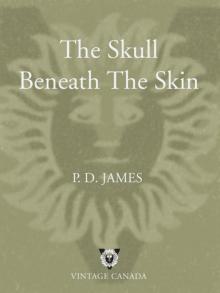 The Skull Beneath the Skin
The Skull Beneath the Skin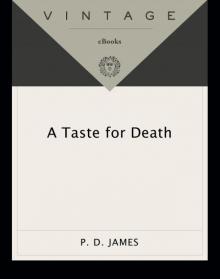 A Taste for Death
A Taste for Death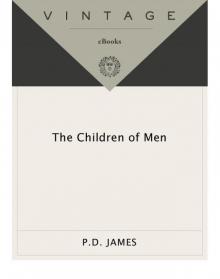 The Children of Men
The Children of Men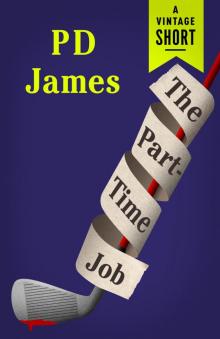 The Part-Time Job
The Part-Time Job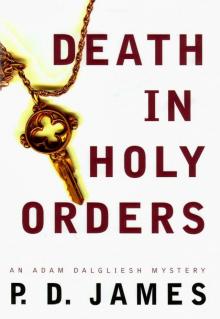 Death in Holy Orders
Death in Holy Orders The Victim
The Victim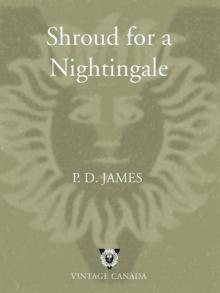 Shroud for a Nightingale
Shroud for a Nightingale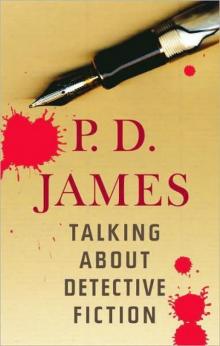 Talking about Detective Fiction
Talking about Detective Fiction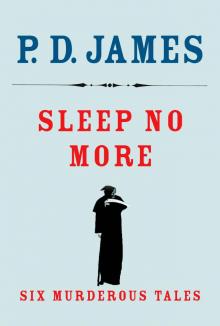 Sleep No More
Sleep No More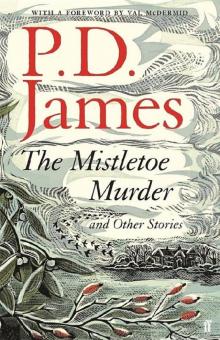 The Mistletoe Murder and Other Stories
The Mistletoe Murder and Other Stories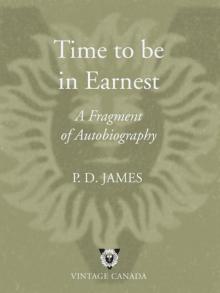 Time to Be in Earnest
Time to Be in Earnest Original Sin
Original Sin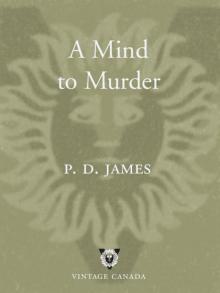 A Mind to Murder
A Mind to Murder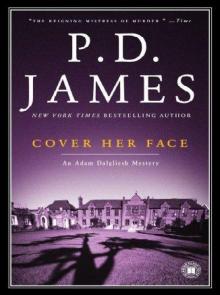 Cover Her Face
Cover Her Face Innocent Blood
Innocent Blood Devices and Desires
Devices and Desires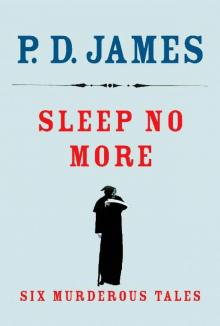 Sleep No More: Six Murderous Tales
Sleep No More: Six Murderous Tales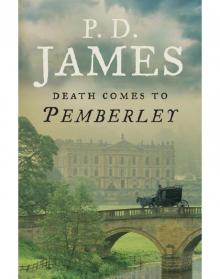 Death Comes to Pemberley
Death Comes to Pemberley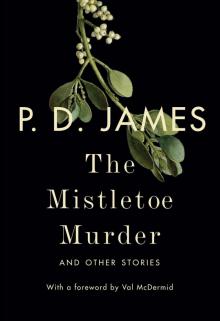 The Mistletoe Murder
The Mistletoe Murder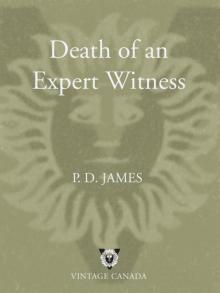 Death of an Expert Witness
Death of an Expert Witness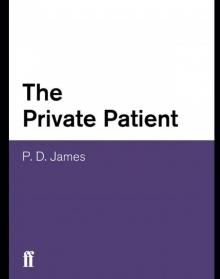 The Private Patient
The Private Patient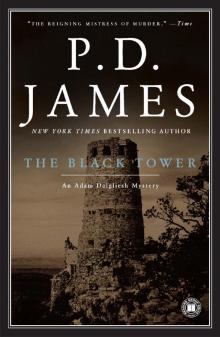 The Black Tower
The Black Tower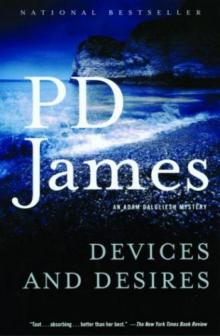 Devices & Desires - Dalgleish 08
Devices & Desires - Dalgleish 08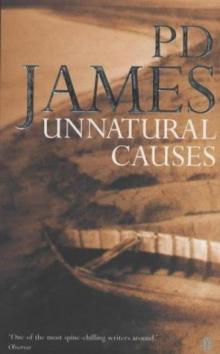 Unnatural Causes
Unnatural Causes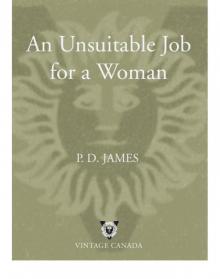 An Unsuitable Job for a Woman
An Unsuitable Job for a Woman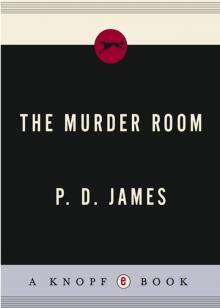 The Murder Room
The Murder Room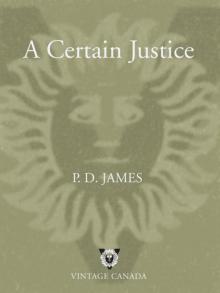 A Certain Justice
A Certain Justice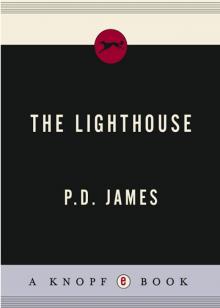 The Lighthouse
The Lighthouse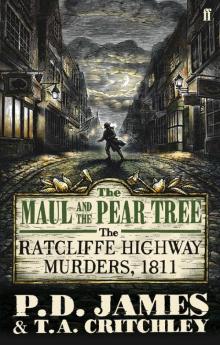 The Maul and the Pear Tree
The Maul and the Pear Tree